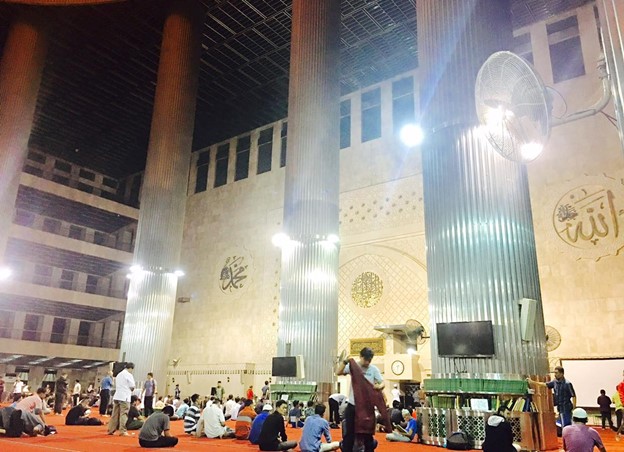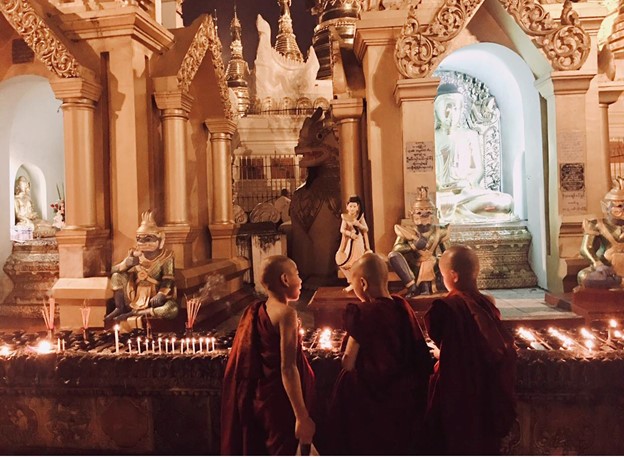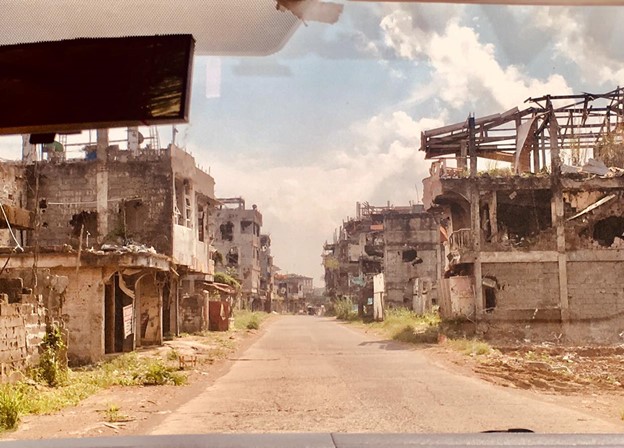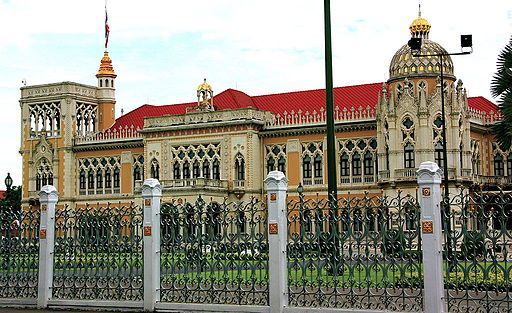“Rationalization and sanitization are particularly problematic when studying conflicts as these issues prevent the researcher from diving into the actual emotional, symbolic, and perceptual experiences of the actors involved that are simultaneously being produced by and are underpinning these events”, writes Dr Michael Magcamit (Incoming Lecturer of Security Studies at the University of Leicester, and Visiting Research Fellow at the Queen Mary University of London)
_______________________________________________

Figure 1: People gather inside the Istiqlal Mosque for the salat al-‘isha (the night prayer) in Jakarta. August 2017. Photo © the Author.
‘I regret doing it.’ These were some of the first few words that came out of Sulaymān’s (not his real name) mouth once we started the interview in a secluded section of one of those nondescript Padang restaurants in downtown Jakarta. ‘I regret being a part of the Jemaah Islamiyah group responsible for the Bali attack in 2002. We killed hundreds of innocent people – Australians, Indonesians, British – and there is nothing that I can do to bring back their lives,’ he continued, his eyes trying to avoid mine. Nervous, I asked, ‘why did you do it in the first place,’ which somehow registered in an accusatory tone. ‘Because at that time I thought I was doing my obligation as a faithful mujahideen, and that is to fight for justice. Our leader told us that it was our duty to defend Islam against the United States for its war on terror in Iraq and Australia for its role in the liberation of East Timor. As you know, most people in those two countries are Christians and are also fierce protectors of the Jews. Growing up, I was taught by my parents and the Muslim elders around me never to trust and rely on these people because they were our greatest enemies. That is why I went to Afghanistan and trained how to become a faithful Muslim fighter. That was my dream. To fight for Allah and his people.’
This excerpt from my 2017 interview with an ex-terrorist bomber from Indonesia was just one of the many pieces of evidence that underscored the significant incongruence that I observed during my fieldwork in Southeast Asia, particularly between how the actual actors involved in protracted violent conflicts think and act, and the mainstream theories of how they are expected to respond and behave. Interestingly, the idea that broad human experiences, including our everyday life, influence the eruption and protraction of internal and intrastate conflicts has largely been criticized and ignored by many in conflict studies (see Suny 2004; Petersen 2011). The overarching goal of making complicated matters easier to grasp and understand has compelled us to pursue theoretical and methodological parsimony based on the assumption of narrowly rational actors and which, in turn, has sanitized the phenomenon under investigation (see, Petersen 2002). Rationalization and sanitization are particularly problematic when studying conflicts as these issues prevent the researcher from diving into the actual emotional, symbolic, and perceptual experiences of the actors involved that are simultaneously being produced by and are underpinning these events. To echo and paraphrase Roger Petersen’s (2002, 11) words: The assumption that human behaviour is entirely focused on maximizing a set of limited goods neglects how the emotions linked to conflicts trigger non-optimizing tendencies and self-defeating behaviours. The assumption that narrow rationality drives outcomes disregards the potent influence of symbols before, during, and after conflicts. The assumption that basic observable measures should always be favoured and prioritized overlooks how perceptions ignite and sustain conflicts.
Many of the people whom I have met during my fieldwork have lived through the horrific violence of internal and intrastate conflicts. Similar to the observations of previous scholars who have studied the connections between emotions and conflicts, such extraordinary experiences have left powerful emotional, symbolic, and perceptual ‘externalities’ among those who have been affected, both directly and indirectly (see, Petersen 2002; Ross 2013; Halperin 2015). These externalities are as powerful and tangible as the arms and capital that define Western rationalist views of conflict. As I have discovered from my research, these unresolved hostile emotive, symbolic, and perceptual mechanisms of ethnoreligious othering are the invisible engines that help drive and sustain the violent conflicts across Southeast Asia (Magcamit 2020). My conversation with a proud hotel termite inspector from Myanmar underlines how these so-called ‘non-material’ and ‘non-rational’ elements influence what and why people do what they do politically, and how they serve as resources for transforming the actors involved and the rules of the game:
[…] ‘They are like Rohingya.’ Jolted by what I heard, I repeated his last words, ‘Like Rohingya?’ What do you mean?’ ‘Yes, Rohingya, do you know them? They are the Bengali Muslims in Rakhine. They rape Burman women, kill Buddhist people, and attack the Myanmar military. They are like termites, eating and destroying the house of Burma. There are many videos on Facebook. But the Americans, the British, and many foreign people think we Buddhists are the bad people. They are the bad people! They are like termites. Many Muslims are termites like the Rohingya.’ Trying to conceal my initial shock, I retorted, ‘But don’t you feel sad for the innocent Rohingya? Not all of them are bad, right? But their houses are also being burned. Their women are being raped and tortured, while their men, sometimes children, and even babies are being killed.’ ‘Hmm,’ he muttered, seemingly disappointed at my question […] I am proud of my job because I protect houses and hotels. Our military and our Lady, Aung Saan Suu Kyi, are also protecting us from the Rohingya, those termites.’

Figure 2: Three novice monks light candles during the Tazaungdaing festival to mark the end of the rainy season in Shwedagon Pagoda in Yangon]. November 2019. Photo © the Author.
Indeed, emotions, symbols, and perceptions are salient and consequential precisely because they enable the framing of conflicts of interest as ‘struggles against hostile, evil, or subhuman forces’ to motivate actions (see, Kaufman 2006b, 52). Since attitudes that have been initially formed emotionally are more sensitive to emotional than intellectual appeals, ordinary people often tend to choose emotionally among opposing values and leaders by reacting to the most evocative emotions, symbols, and perceptions depicted (based on Kaufman 2019). Accordingly, cunning leaders routinely evoke these elements by reinterpreting conflicts of interest as struggles for collective security, status, and future, to motivate people to act. This helps explain why our politicians’ rhetoric usually favour emotional, symbolic, and perceptual appeals to group identity, ideology, and morality, over rational arguments. Despite this, the rationalist assumption of a straightforward relationship between individual and group preferences, information collection, and belief formation remains at the crux of existing peacebuilding strategies. Yet, without profound appreciation for these intangible but highly crucial elements, violent clashes between rival groups are bound to re-emerge and remain entrenched over long periods, ensnaring them into a cycle of mass hostility, security dilemma, and chauvinist political mobilization.
As such, these deep-seated chauvinistic emotions, symbolic predispositions, and perceptions harboured by rival ethnoreligious groups need to be directly confronted and addressed to escape this trap. Pursuing peace negotiations while disregarding the need for emotional, symbolic, and perceptual reconciliation and regulation is tantamount to constructing peace in the shiftiest of sands. To borrow Stuart Kaufman’s (2006b, 15) assertion regarding the centrality of reconciliation in conflict resolution: ‘Both sides should expect not merely abandonment of provocative rhetoric by their opposite numbers, but explicit mutual acknowledgment of each side’s own responsibility and of the other side’s wounds. Ultimately, leaders on both sides need to reconstruct their discourses to emphasize the strands that justify peace and reconciliation, side-lining the hostile discourses that lead back into the [emotive, symbolic, and perceptual] politics trap. At the same time, the societies themselves must rebuild their relationship into one that is cooperative enough to allow the solution of mutual problems and compatible with positive images and attitudes toward the other group.’ Only then can we have a chance to break the wheels of chauvinistic ethnoreligious otherings and the conflicts they inspire. If not, the risk of becoming like the mosque-phobic taxi driver I met during fieldwork looms large:
‘Sir, do you mind if I drop you off in front of Mercury Drug? I don’t want to enter that Muslim area,’ he asked as he lowered the volume of the car’s stereo. ‘Why? Is there something wrong?’ I asked worriedly. ‘I’ve heard a lot of bad things happening there from the other taxi drivers. One of my friends got robbed and was stabbed three times the other day and died on the scene. […] ‘But how did you know that they were Muslims?’. Without thinking for a second, the driver replied, ‘Of course they are Muslims. That’s what they do. Most of the crimes happening here in the Philippines are being committed by Muslims. They don’t fear God, so it is easy for them to kill innocent people who are just trying to make a living. I am sure many of them are members of that syndicate that kidnaps and sells children.’ Seeing the driver transformed from being the hopeless romantic guy who enjoyed schmaltzy Air Supply love songs into a spiteful Islamophobe rudely awakened me to some of the ugly truths about Catholic-Muslim relations in the country. ‘People will surprise you,’ I thought to myself.

Figure 3: More than two years after the government’s indiscriminate bombing of Marawi, much of the city remains in ruin. September 2019. Photo © the Author.
References
Halperin, Eran. 2015. Emotions in Conflict: Inhibitors and Facilitators of Peace-Making. London: Routledge.
Kaufman, S., 2006a. “Symbolic Politics or Rational Choice? Testing Theories of Extreme Ethnic Violence. International Security, 30(4), pp.45-86
Kaufman, S., 2006b. “Escaping the Symbolic Politics Trap: Reconciliation Initiatives and Conflict Resolution in Ethnic Wars. Journal of Peace Research, 43(2), pp.201-218.
Kaufman, S., 2019. “War as Symbolic Politics.” International Studies Quarterly, 63(3), pp.614-625.
Magcamit, M., 2020. “Imagined Insecurities in Imagined Communities: Manufacturing the Ethnoreligious Others as Security Threats. International Studies Quarterly, 64(3), pp.684-698.
Petersen, R., 2002. Understanding Ethnic Violence: Fear, Hatred, and Resentment in Twentieth-century Eastern Europe. New York, NY: Cambridge University Press.
Petersen, R., 2011. Western Intervention in the Balkans: The Strategic Use of Emotion in Conflict. New York, NY: Cambridge University Press.
Ross, A., 2013. Mixed Emotions: Beyond Fear and Hatred in International Conflict. Chicago, IL: University of Chicago Press.
Suny, R., 2004. “Why We Hate You: The Passions of National Identity and Ethnic Violence,” Berkeley Program in Soviet and Post-Soviet Studies Working Paper Series (https://escholarship.org/content/qt3pv4g8zf/qt3pv4g8zf.pdf).
* This blog is based on the Author’s recent talk at the Saw Swee Hock Southeast Asia Centre Seminar Series: Solidarity and Polarisation: Centripetal and Centrifugal Forces in Southeast Asia
* The views expressed in the blog are those of the authors alone. They do not reflect the position of the Saw Swee Hock Southeast Asia Centre, nor that of the London School of Economics and Political Science.





